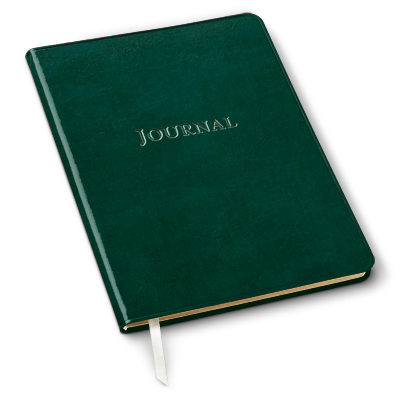Decades of Journals

I had a journalism teacher in high school named Jean Williams, who designated me an editor of our high school newspaper. We got along famously, and I continued to visit Ms.Williams for many years after graduation. On one of those visits she advised me to begin keeping a journal. She said, “It’s our nature that we forget some things, and remember others wrongly. You will thank me one day.” Unfortunately, she did not live long enough for me to thank her, but as I sit here–over three million words later–I am truly grateful that I took her advice.
I began my first journal 34 years ago, and have kept one each year since. I was living in Roanoke, Virginia in 1979, and bought my first blank journal at Roanoke Stationery downtown. It was one of those old shops with high stamped tin ceilings and creaking wooden floors. Dimly lit shelves were lined top to bottom with stationery, pens, tablets–all manner of writing implements. It smelled like the first day of school–like ink and fresh paper. Two old gentlemen approached–each with long white whiskers, looking like they stepped out of the 1800’s–and quietly asked if they could be of assistance. I told them I wanted a journal and they directed me immediately to a variety of them, some of which had the upcoming year embossed on their covers.
I took to writing with enthusiasm, and my journal was soon filled with entries. The year 1985 alone required two volumes, while other years have long passages where precious little was written. Beginning in 1999 the journals became digital and exist now as electronic files on a computer. One constant has been the annual surprise that another journal is finished, and the time has come to begin a new year. I began with one journal and now have stacks of them in closets and boxes. How quickly the years flew by.
A journal does many things. For one thing, it forces the writer to recount events honestly, which also causes a bit of reflection. When you record things fresh in your mind on a daily basis, you are much more likely to be accurate. There were times throughout the years when I neglected my journal, and when I got back around to adding journal entries I found myself playing fast and loose with the facts. Sometimes I would have forgotten most of what I should have written. (Let that be a lesson to would-be journalists. Don’t skip a day, for you may not recall it as you should).
Another way a journal helps is with pinpointing repetitive activity–particularly bad things you wish you had not repeated. I’m always amazed, whenever I take the time to reread a particular year, how little I changed as time went on. I repeated some very bad habits for far too long. My personality–at least as I spilled it out on paper–remained virtually identical to the one I began with all those years ago. I may have moved around, had new personal relationships, changed jobs, or continued my education. But inside I remained the same person. Same general outlook, though I may have changed some of my habits.

Like it or not, a journal–if kept honestly–records the facts and keeps them straight, capturing things that would otherwise be lost in the fog of memory. Our minds do play tricks on us. When I go back and read a particular year, I find my memory of events is always different from the version I recorded. Yet, I know my recorded version is the true one because I instantly recognize it. The memory of that day and its events will come flooding back as though a door were flung open in my mind and everything spilled out. Sometimes a single sentence is enough to trigger sights, smells, and sounds. It might be someone’s laughter, a particularly delicious food, or how the light reflected off the water that day. Whenever that happens I give a silent thanks to Jean Williams.
Lastly, keeping a journal can help a person to become a better writer. You cannot help but become a better writer if you write a lot. I realize that writing is not an activity everyone is interested in. You either aspire to write well, or you don’t. I did, and still do. Keeping a daily record, which is always in one’s own voice, helps to distill one’s writing. In the early days, when I recorded entries by writing longhand, I would have to be short and to the point or risk hand cramps. I got in the habit of being concise.
When I look back at all that writing, I wonder what to make of it. Are there life lessons in there? Is there a book in all that material somewhere? Maybe a few interesting blog posts? Did it make me a better person? Maybe none of those. But the history in those journals interests me, since I am the main character in all of it. Perhaps one day, when I cast about for a good book to read and can’t find one, I’ll pick up a journal and take a trip down memory lane. A trip where I am always the star–where all my activities, whether sublime or stupid, are there for me to rediscover.
And though I am not as old or wise as Jean Williams was when she mentored me, I say this to anyone who might be interested in beginning a journal: Start now. Write it simply, and in your own voice. Don’t worry about grammar or spelling. Don’t worry that it’s too short or too long. Don’t worry if you miss a day, a week, a month–but come back to it when you can. Make it a habit, and start it now. You will never be younger, and it’s never too late.
Now, BEGIN.
© Wade Kingston
